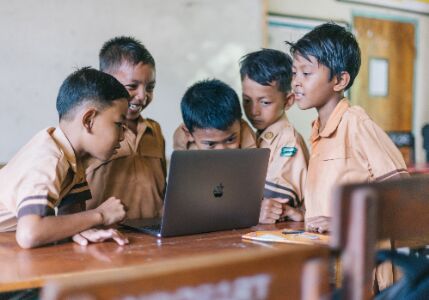Nexus of Good: Thinksharp Foundation
To bridge the rural-urban divide in school education, the decade-old organisation is collaborating at remote levels to ensure much-needed digital education

With a vision to "to bridge the rural-urban education divide", Thinksharp Foundation was set up in 2011 by Santosh Phad who comes from a small village in the Beed district of Maharashtra. His humble beginnings enabled him to appreciate the ground realities. It was while doing his MBA that he understood the role of technology in bridging the urban-rural divide in the context of school education. The Foundation that he set up believes every child has the right to get quality education and a better future. The method includes providing better educational infrastructure through digital tools, libraries, financial support, games, and other educational activities for children. The Foundation is working tirelessly with the village community, teachers, government, and other stakeholders for creating a progressive and positive learning environment for the young minds of the nation.
The Foundation started a project "StudyMall", inspired by shopping malls. This Thinksharp's flagship programme is an approach to modernise the educational infrastructure with the help of technology and creativity. Over the years, several projects covering digital learning tools, computer education, solar energy, library and colourful classrooms etc. have been initiated. The primary objective is to enhance children's interest in education and to improve their learning outcomes. An improved engagement of students and teachers is considered crucial to achieving that.
"Digital class" — the most prominent project initiated under the StudyMall programme — aims to provide education through multimedia/digital platforms in government-run schools in rural India. Gone are the days, when a piece of chalk and a board on the wall was enough to sail through the entire schooling life. Students need more visually appealing animations and pictures to enhance their imagination and interest in education. Most of the private schools have already realised this and adopted the idea of digital learning. The project facilitates the provisioning of such gadgets and systems as a part of the entire infrastructure.
"Modular Library" was initiated with a belief that a wide variety of books will help foster positive reading attitudes among children. The name "Modular" suggests that these libraries are portable and can be easily added with books. Each set contains 30 to 35 richly illustrated books for children which can be hung on the wall and be removed when needed. Instead of categorising by age, reading levels 1-4 ranging from emergent to fluent is used as per students' abilities. This unique format enables children to interact freely with the attractively displayed books on the wall.
"Computer Mitra" and "Solar Shala" are two other of the Foundation's project. As the name suggests, "Computer Mitra" aims to teach computer skills to rural children from public schools. Children have a fascination for computers but the lack of appropriate funding is one of the biggest hurdles in such schools. Students from standard 6th and above are eligible to enrol under this project. Trainers conduct a three-four month-long course of basic operations on computers including working with MS Office, emails, typing, operating systems among others. Periodic assessment is done and certification on clearing the test follows at the end.
"Solar Shala" is the most recent initiative aimed at solving the recurrent electricity supply-related issues in rural areas. A constant and reliable source of electricity is the most crucial requirement for a digital learning environment. Unfortunately, schools face issues on account of non-payment of monthly charges, technical problems during the rainy season and load shedding sessions. In order to overcome these issues, the Solar Shala project was initiated to set up solar power systems in rural schools to provide them with uninterrupted electricity.
Home Schooling Project was launched during the ongoing pandemic to provide access to online learning and connect students with their teachers to sustain their learning. A large number of children benefited from this as they were provided tablets and internet connectivity to learn online.
"Digi Library" is an android application that was also launched during the pandemic to provide free access to wonderful non-academic books — both in PDF and audio/video format in association with Pratham Books and other publishing houses.
Financial contribution for these projects comes from the sponsors but the schools and the community also participate to develop schools. Contribution varies from school to school. It is ensured that school and community provide both monetary and non-monetary contributions. Typically, the foundation invests around Rs three lakh in a village school, of which Rs 1.5 lakh goes for the solar panel, Rs 50,000 for the physical library and Rs one lakh for e-learning and monitoring assessment maintenance.
As mentioned earlier, the primary focus of the Foundation is the rural government school. The idea is to help the maximum number of children and rural government schools. The association with such schools is long-term where need-assessment, implementation, continuous monitoring, evaluation and ensuring the sustainability of projects is done in close association with teachers, centre heads and taluka education officers. An MOU is signed with respective schools and taluka education officers in which roles and responsibilities of foundation and schools are mentioned.
At the end of the academic year, a detailed report is shared with education officers and other stakeholders from the government. Taluka education officers help in developing schools from cluster/taluka. Association with gram panchayat and SMC (School Management Committee) ensures that every child from the village enrols and attends the village school instead of paying a hefty fee in private schools.
The Thinksharp Foundation with its commitment to impart 21st-century education for maximum rural children presents a wonderful example of Nexus of Good. It started small with a few schools, and having tested the proof of concept, is now scaling its operations through a public-private partnership.
Views expressed are personal



